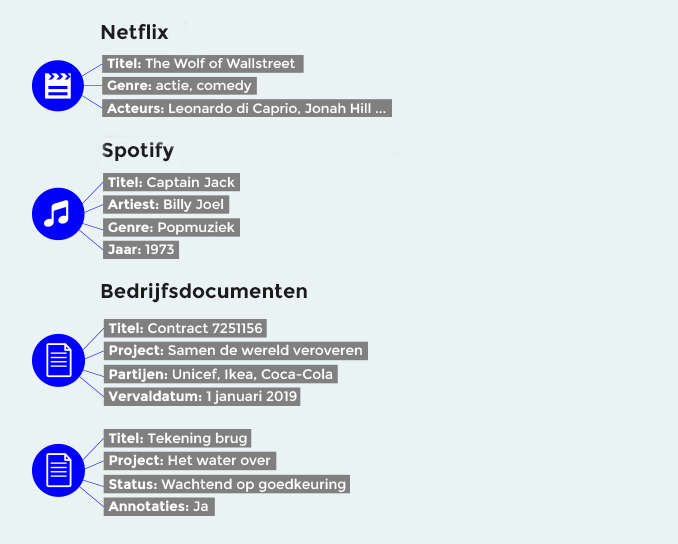
Metadata make it possible to organise large amounts of documents and information.
This article answers the following questions:
- Why metadata matters?
- How Spotify and Netflix use metadata from the start?
- What are metadata?
- Metadata is the document management solution for organisations?
We live in a digital society. Most people follow the news on their phones, groceries are ordered on the couch with a tablet and we stream films via our smart TV. Products and services for consumers are digitising at lightning speed, but businesses and governments are also increasingly working digitally. Thanks to digitisation, the number of videos, documents, images, etc. is growing dramatically.
Organisations in particular are increasingly struggling to manage all this data and information, with the result that much information and data becomes untraceable.
A challenge where organisations can learn a lot from Netflix and Spotify.
Content
Unexplained structure
Take your own private computer as an example. Most likely, you also have documents, photos and films on there. Perhaps you have all your documents in the same folder. However, chances are that you have devised a structure to organise your documents, where you have a folder for each subject or theme. In each folder there are probably subfolders and in those subfolders, you guessed it: again folders and so on. We call such a subdivision a folder structure. With a growing amount of data, information and documents at many organisations, these folder structures also grow. Not to mention that we were talking about a single structure. In an organisation, people often have their own folder structure, which can differ a lot from each other.
And therein lies the problem: how do you find a specific document in a plethora of folders with different structures as well?
Spotify and Netflix work with metadata
Spotify hosts more than 30 million music tracks. Imagine if these songs were organised into folders.
There are more than 30 million music tracks on Spotify. Imagine if these songs were organised into folders, how would you ever find music? Netflix has thousands of movies and hundreds of series. Can you already see yourself browsing through these thousands of folders in search of a great new film?
So Spotify and Netflix face the same challenge as most organisations: making objects quickly and easily findable. What music and movies are to Spotify and Netflix, for organisations documents, presentations, projects, customers, contracts, drawings and so on.
To make a music track findable, it gets more information than just a name on Spotify. The record 'Captain Jack' is not only a song by Billy Joel, it is also 'Pop Music', released in 1973 and part of the album 'Piano Man'. As a result, you may find this song because you are interested in pop music or songs from a specific period. The same goes for films. I want to see a film with Leonardo di Caprio, preferably recent and, if possible, with quite a bit of action and humour. See there: The Wolf of Wallstreet. All entrances to get to an object.
Metadata are properties of information
Simply put, Spotify and Netflix give their music and movies labels such as title, year, genre, etc. Such labels are called metadata, meaning characteristics of information. Organisations can also give such characteristics to their documents.
In the image below, you can see a good comparison.

By labelling, or adding metadata, documents become easily and quickly findable. This allows organisations to create all kinds of overviews that provide great insight. In the image below, see how metadata allows organisations to increase their insight.

Many organisations still work with folder structures that make information difficult to find. This in turn results in duplicate documents creating dark data.
Metadata-based DMS
M-Files is the information management system that offers uniquely powerful metadata capabilities. With it, organisations find documents and information at lightning speed, create dynamic insights and reports are created in no time.
Would you like to see this live in action one day? Then sign up for The M-Files webinar and see for yourself how corporate documents and information are found like Netflix and Spotify would.